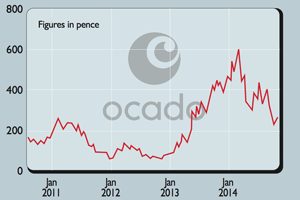
The online supermarket’s shares are too pricey, but the business has promise, says Phil Oakley.
Online supermarket Ocado was set up in 2000 and started out delivering groceries for Waitrose in 2002. While it has struggled to make any significant profits over the past 14 years, it has steadily grown its customers and sales.
However, since the company decided to list its shares on the London Stock Exchange back in 2010, it has had to put up with growing scepticism about its business model. Some City analysts have questioned whether Ocado can ever make any serious money, or whether its shares are worth anything at all.
The shares have been extremely volatile and have lost more than half their value since their February peak. If that wasn’t bad enough, Ocado has found itself embroiled in a supermarket sector that can best be described as a bloodbath, where profits are under severe pressure.
Overall, the bear case on Ocado is very easy to make and hasn’t changed for some time. In a nutshell, the company has struggled to make money throughout its history and therefore is unlikely to do so in the foreseeable future. If you accept this, then you’ll give the shares a wide berth. But the counter argument is that this view is a little short-sighted.
Shopping trends favour Ocado
There’s no doubt that more and more households across the country are becoming fed up with trudging around a supermarket every week. It is an increasingly time-consuming and miserable experience as the supermarkets cut costs and customer service declines with the introduction of self-scanning checkouts. Doing your weekly shop online is looking like a better option and this market looks like it can grow for a long time to come.
The question is whether this will justify all the millions of pounds invested by Ocado. Unlike the big supermarket chains who fulfil most of their online grocery orders by picking them in their stores, Ocado has gone down a different route. It has built a business based on massive warehouse hubs that branch out into more local and smaller sheds, known as spokes. This has been backed up with a significant investment in IT and machinery that aims to pick and deliver groceries in a cost-effective way, while also ensuring high levels of customer satisfaction.
And while people may quibble about the lack of profits, Ocado seems to be keeping its customers happy and getting more of them on board. Over 95% of its orders are delivered on time, while more than 99% are exactly what the customer wanted and involve no irritating substitutes. This gives Ocado a competitive edge. What it needs though is a lot more customers. If it can woo more from the likes of Sainsbury’s and Tesco, then it might start making the sort of money needed to justify its share price.
Encouragingly, there are signs that the company is finally beginning to see some traction in its profits. During the last financial year, it has generated trading profits of just over £11m. Sales have recently received a nice boost from a deal to do online deliveries for Morrisons, in addition to its existing tie-up with Waitrose. It is also adding new lines of business, such as its own pet store and homeware. City analysts expect profits to increase to £55m in two years’ time.
A tough environment
That said, there are reasons to wonder whether Ocado can withstand the fierce price competition in the supermarket sector. Ocado’s average basket size is falling as prices are cut, which makes it harder to make money. Then there’s the fact that it keeps on spending more money on building new fulfilment centres, which keep ramping up the cost base. This may be a wise long-term decision, but it depresses profits further in the short run.
Then there’s the future of Ocado’s long-standing agreement to deliver food for Waitrose. There is a break clause in this contract in 2017 and many think that Waitrose will go it alone with its own delivery business. However, this may not be disastrous for Ocado as it has been steadily reducing its reliance on Waitrose goods to less than a third of its sales. There’s also the question of whether Waitrose will want to spend millions on building up its own infrastructure while freeing up space within Ocado for a rival, such as Marks & Spencer.
Above all else, it’s the price of Ocado’s shares that remains the biggest issue facing investors. The business has a market capitalisation of £1.6bn and trades on an eye-watering multiple of more than 140 times forecast profits. It looks ridiculously expensive on just about every valuation measure. By my reckoning, assuming a 10% return on investment, the current share price is implying that Ocado can sustainably generate £160m of trading profits (£1.6bn x 10%).
That’s not going to happen anytime soon by the look of things. So how can the shares justify their current price tag?
The short answer is that they could be worth it in the hands of another owner. It could be that Ocado’s management team are hoping that all the money spent building up the scale of the business might tempt someone to buy it all. Companies such as Waitrose, Marks & Spencer, or even Amazon, might think that it would give them the competitive edge they need.
I wouldn’t buy Ocado shares right now at 273p, but I think they have some value. I might become more interested if they were a pound cheaper.
Verdict: one for your watchlist
Ocado (LSE: OCDO)
Share price: 273p
Market cap: £1.6bn
Net assets (May 2014): £215m
Net debt (May 2014): £44.6m
P/e (prospective): 143.7 times
Dividend yield (prospective): 0%
EBIT/EV (latest): 0.7%
Price-to-book-value ratio: 19.3 times
ROCE: 4.2%
Interest cover: 3.1 times
What the analysts say
Buy: 6
Hold: 4
Sell: 6
Target price: 330p
Directors’ shareholdings
T Steiner (CEO): 28,696,581
D Tatton-Brown (CFO): 159,094
S Rose (Chair): 750,000